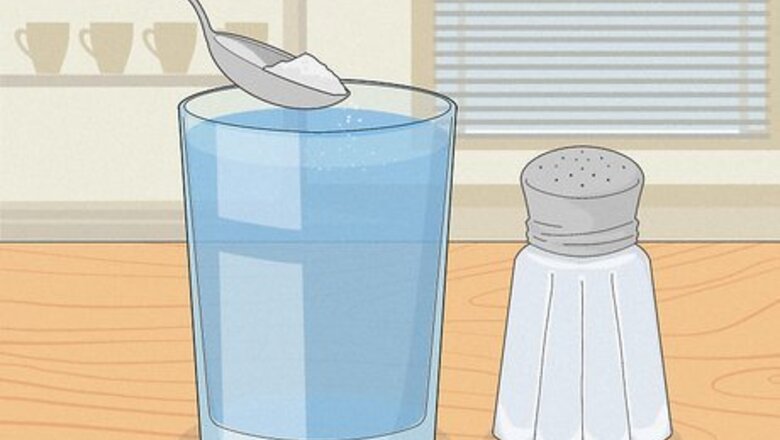
views
Using Natural Remedies
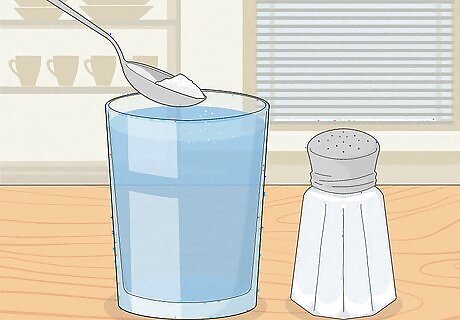
Gargle salt water. Add half a teaspoon of salt to 8 ounces of warm water and mix well. Sip and gargle for 10 seconds, then spit--do NOT swallow. The salt helps to cut through excess phlegm (which can cause an itchy, tickling feeling in the throat) and reduce inflammation. Repeat this 2 to 3 times per day, until your throat feels better.
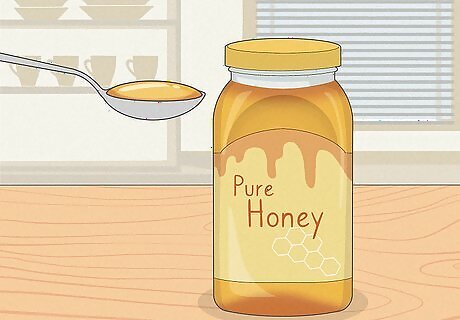
Eat some honey. Honey is a fantastic natural remedy, as it coats the throat and quickly relieves any itchiness or irritation. For best results, eat a tablespoon of honey each morning. Use raw, local honey where possible. Stirring a tablespoon of honey into your tea is another viable option if you can't stomach the raw stuff. Never give honey to infants under the age of 12 months, as the bacteria it contains can cause a condition known as infant botulism, which may lead to death.

Make honey, lemon, and ginger tea. Add a small amount of honey to the bottom of a cup and fill to the top with hot water. Then, squeeze one to three wedges of lemon in. Finally, grate a small amount of ginger and stir. Drink several times throughout the day to soothe an itchy, sore throat. You may also try using tea that contains cinnamon or licorice root to help with the pain.

Drink milk with turmeric. Turmeric in milk is a home remedy for soothing an itchy throat that has been around for many years. Before bedtime, boil a cup of milk in a saucepan with a teaspoon of turmeric (you can also mix the turmeric with water if you prefer). Allow the milk to cool slightly before drinking. Drink each night until the itchy throat disappears. Find quick at-home remedies for itch relief. "When my seasonal allergies kick in, my throat gets so itchy and irritated. After reading this, I started sipping warm salt water, lemon-ginger tea, and local honey. The honey and tea especially provide quick, soothing relief without medicine. I'm glad to have easy, natural solutions right from my kitchen." - Amed M. Learn proper techniques to maximize remedies. "I'd tried honey and vinegar drinks before for my sore, scratchy throat but wasn't seeing much improvement. This article explained important details like using raw local honey, adding maple syrup to improve taste, and not exceeding a tablespoon. Now that I'm following the instructions properly, these remedies actually give me noticeable relief!" - Azaliah C. Discover new solutions from global home remedies. "As someone interested in holistic healing, I appreciated learning about international home remedies I'd never heard of. The turmeric milk and horseradish drink opened my eyes to new possibilities beyond honey and lemon. It's been exciting testing these traditional remedies from India and Russia in my own kitchen." - Latha G. Gain awareness of when to escalate to a doctor. "I used to just tough out any throat irritation until it went away. But this article outlined important symptoms like high fever and trouble breathing that mean I should see my doctor right away. Now, I know when home remedies are appropriate and when I need a medical professional. This could prevent me from ignoring a dangerous problem." - Sydney H. Have a story our readers should hear? Share it with 1 billion+ annual wikiHow users. Tell us your story here.

Drink apple cider vinegar. Apple cider vinegar is used in many home remedies and has a broad array of health benefits -- one of which is relieving an itchy throat. Add a tablespoon of apple cider vinegar to 8oz of hot water and sip slowly. You can add up to a tablespoon of honey to the drink to improve the taste, if you like. Maple syrup is a good alternative if you don’t like the taste of honey.
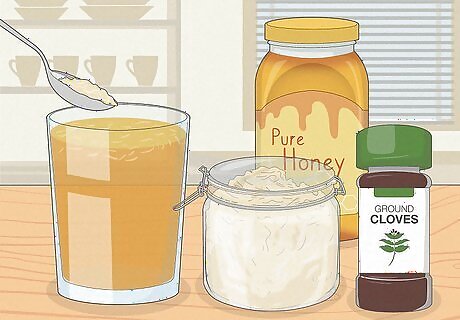
Try horseradish. In Russia, a popular home remedy for relieving a sore throat involves making a drink from horseradish. In a glass, combine one tablespoon of pure horseradish (the plant, not the sauce) with a teaspoon of honey and a teaspoon of ground cloves. Fill the glass with hot water, stirring to distribute the horseradish mixture, then drink slowly.
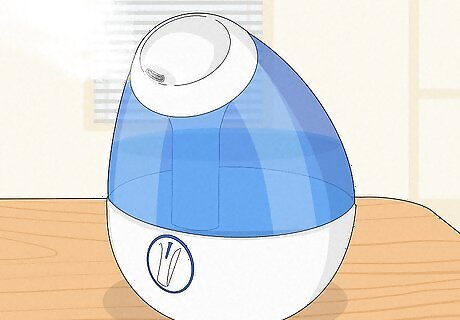
Use a humidifier. Living or sleeping in a very dry environment can cause your throat to become dehydrated and itchy. Placing a humidifier in your living area or bedroom will add moisture back into the air and help to soothe an itchy throat. If you don't want to invest in a humidifier, you can achieve the same results by placing a large bowl of water under the radiator or by keeping plants in your living space.

Drink more water. Dehydration is one of the most common causes of an itchy throat, as your throat becomes dried out and there is not enough mucus to lubricate and protect the sensitive tissue. Try to drink at least 8 glasses of water per day and drink plenty of green and herbal teas. Drinking water is especially important if you have a flu or cold, as you tend to lose a lot of fluids through sweat (from fever) and mucus (from sneezing and blowing your nose).
Protecting Your Throat

Get rid of bad habits. There are a number of substances that can cause dehydration and lead to a sore, itchy throat when used too frequently. Drinks that contain caffeine like coffee, tea and soda can lead to dehydration (and affect your sleep) so try to cut them out or at least cut down. Recreational drug use and certain medications (like antidepressants) can lead to dehydration and throat irritation. Smoking cigarettes is very drying on the throat and can lead to itchiness and irritation (along with a host of other health issues) so think about quitting, or at least cutting back.
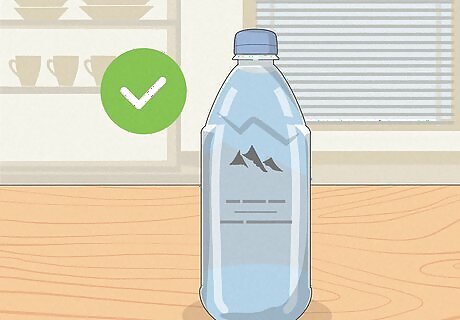
Protect your voice. Things like talking too much, shouting, or singing can cause your throat to become overworked, leading to dehydration and itchiness. If you believe this may be the cause of your itchy throat, try to give your voice a break by resting it (no talking, singing or shouting) for at least an hour or two each day. If your work involves using your voice a lot, remember to keep a bottle of water on you at all times so you can keep your throat lubricated and stay hydrated throughout the day.

Deal with any allergies. An allergic reaction to a certain food, plant or pollen can cause symptoms such as watery eyes, sneezing, congestion and an itchy throat. Try taking an antihistamine tablet daily to see if this alleviates your symptoms. Also try to identify the exact cause of the allergy by keeping a food diary or seeing your doctor for an allergy test.
Using Over-The-Counter Remedies

Suck on a throat lozenge or cough drop. Regular throat lozenges don't do much to heal your throat, but they do alleviate the pain. The extra saliva you produce with the candy in your mouth will lubricate the throat to relieve the itchy feeling. Meanwhile, the medication in the drop acts as a local anesthetic which numbs the irritation in the throat.
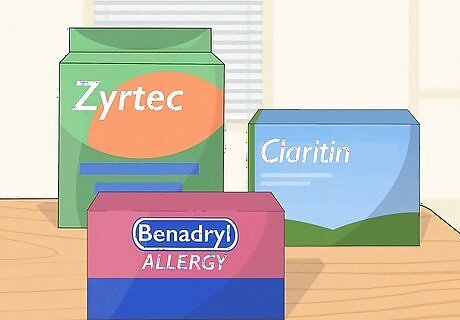
Use an antihistamine. Antihistamines block histamine, a chemical in your body that can cause an itchy throat. Benadryl, Zyrtec, and Claritin are just a few brands of cold and flu antihistamines that are designed to soothe scratchy and sore throats. Side effects of antihistamines may include dry mouth, dizziness, and headaches.
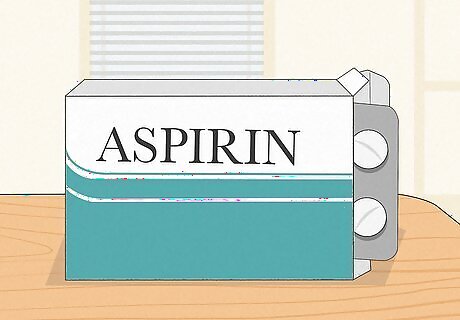
Try a pain reliever. Plain old pain relievers, also called analgesics, like aspirin and Ibuprofen can also help to relieve the pain associated with an itchy throat. Follow the directions on the packaging for correct dosage. Keep in mind that aspirin should never be given to children or teenagers recovering from chickenpox or flu-like symptom, as it can lead to the rare but fatal Reye's syndrome.
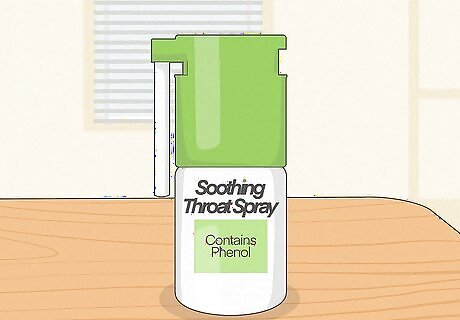
Use throat spray. Throat spray is a great way of relieving itchy throats and dry, tickling coughs. They usually contain phenol (or a similar ingredient) which numbs the throat. Throat sprays are available over-the-counter in most pharmacies and are relatively cheap. Some throat sprays even come in different flavors, like mint or berry flavor.
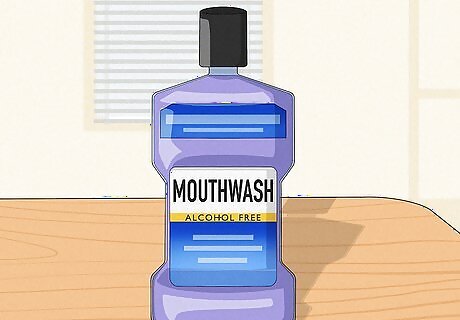
Gargle mouthwash. Gargling with a mouthwash that contains menthol (such as Listerine) a couple of times per day helps to numb the throat, alleviating the irritating, itchy feeling.
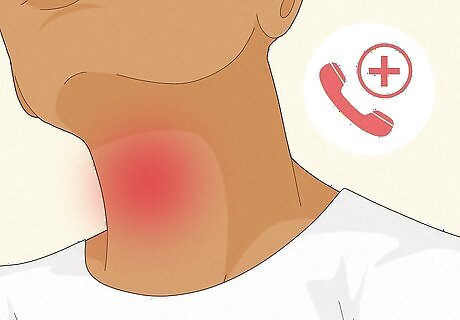
See a doctor for severe or persistent symptoms. Most of the time, an itchy throat will get better with at home treatment. However, if your symptoms last for more than 10 days, worsen rapidly, or are accompanied by a high fever, you should call your doctor. If you are experiencing wheezing or trouble breathing, hives, facial swelling, a severe sore throat, fever, or difficulty swallowing, see your doctor immediately. Any of these symptoms could signal a more serious problem. An itchy throat could be the result of an allergic reaction to food or medicine, which could occur between a few minutes and a few hours after consuming the trigger substance. This can be life-threatening. A itchy or sore throat may also signal a bacterial or viral infection that requires a doctor’s attention, like strep throat, tonsillitis, or the flu. In some cases, an itchy throat is the result of heartburn or a side effect of medication like ACE inhibitors for high blood pressure.




















Comments
0 comment